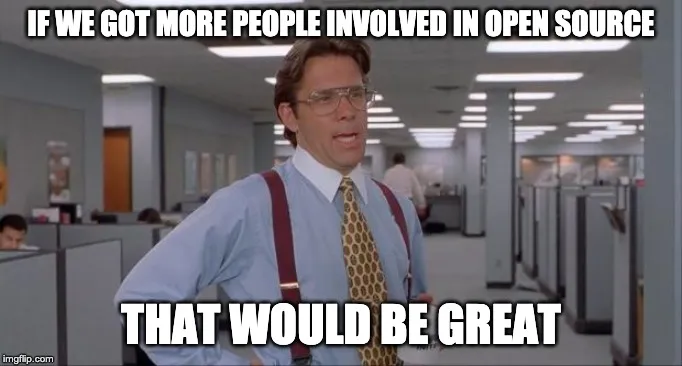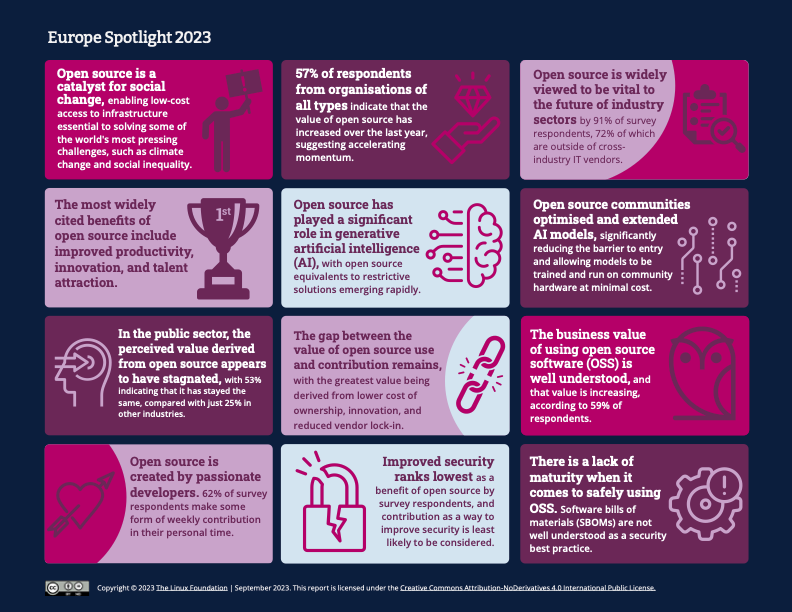The Next Generation Internet (NGI) initiative, part of the EU’s Horizon program, has been a key supporter of open-source software development since 2020. However, reports in July revealed that NGI funding is nearly absent from the 2025 proposal for Horizon, despite its demonstrated success in fostering both emerging and established projects. In response, over 100 open-source organizations signed an open letter authored by Pierre-Yves Gibello, CEO of the open-source consortium OW2, urging EU officials to reconsider the funding cuts. Advocates for open source have shared the letter widely, adding their voices to the call for continued support.
This free software program is key to supporting a sovereign European internet infrastructure and promoting a diverse, human-centered internet ecosystem.
Source: Article 19
What is Open Source and Why Does it Matter?
Open-source applications are integral to modern life. Many users rely on open-source software like Linux (which powers Android), Mozilla Firefox, WordPress, and VLC Media Player daily. Developers, too, benefit from tools like Python and Apache, which exemplify the collaborative, iterative nature of open-source development.
Unlike proprietary software, open-source software is developed with publicly accessible source code that anyone can view, modify, or build upon to support learning and innovation. This approach fosters diversity, transparency, and collaboration. At its core, open-source software prioritizes a human-centered vision of technology, keeping power in the hands of individuals and communities rather than large corporations or governments—a stark contrast to the data-centric models in many other powerhouse countries.

Implications for the EU Digital Landscape
According to the open letter, the Horizon program has contributed €27 million to NGI funding since 2020, supporting projects within Cluster 4, which focuses on digital, industrial, and space sectors. See a list of initiatives here. Gibello’s letter warns that discontinuing NGI funding could hinder technical innovation in Europe and affect EU governance over digital policies and regulations.
“Contrary to common perception, technical innovations often originate from European rather than North American programming communities and are mostly initiated by small-scale organizations,”
Gibello states in his letter.
The NGI program has supported thousands of grassroots initiatives at the core of open-source innovation, and which have a proven track record of sustainability and offering viable alternatives to existing market solutions. He also highlights that the EU has relied on open-source software to help govern digital laws, such as General Data Protection Regulation (GDPR) for privacy protection and the Cyber Resilience Act for cybersecurity. Notably, over a third of NGI projects support compliance with GDPR, while around 23 percent aid the implementation of the Digital Services Act (DSA) and Digital Markets Act (DMA), which promote responsible content management and fair competition in the digital economy.
This potential shift in funding signals a broader question about the EU’s approach to managing personal data and cybersecurity. As countries like the USA, China, and Russia heavily invest in proprietary software to gather consumer data, the EU cannot afford to fall behind. The EU has adopted stricter data privacy laws like the General Data Protection Regulation (GDPR) as a means to limit how organizations can collect, store, and share consumer data, giving EU citizens more control over their information and to prevent powerful entities such as large corporations from exploiting such data. Open-source software, inherently more transparent, offers a strong defense against potential foreign interference and allows the EU to uphold its commitment to data privacy. By fostering publicly inspectable open-source software, the EU promotes security, transparency, and citizen empowerment, while minimizing reliance on foreign, proprietary technologies.
How This Affects Our Innovation?
At Grey-box, most of our innovations are open-source because we believe in contributing back to the community by making our innovation available for further collaborations, especially for those with the same mission to improve connectivity in remote areas and equality in access to education and knowledge. As a supporter of open-source innovation, we are deeply concerned by the news of potential EU funding cuts that could stifle open-source progress globally and further erode our rights and freedoms. In solidarity with the open-source community, we share this open letter here and add our name to the list of supporters. If you resonate with this mission, please help amplify this voice to ensure that innovation in the EU continues to serve and protect the public. We would like to encourage everyone in the open-source community and beyond to add their voice to this petition. Together, we can ensure that the EU continues to foster innovation for the public good. The letter remains open for signatures until January 1, 2025.



0 Comments